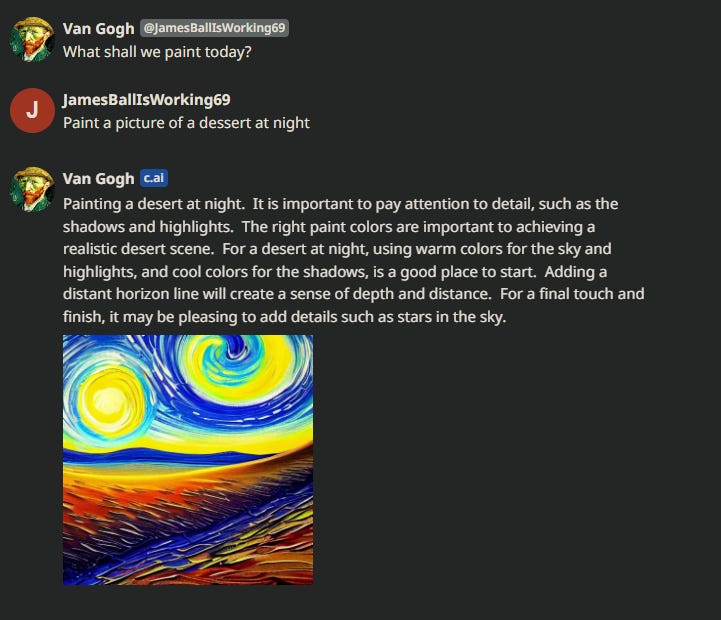Is Character.ai the Underdog of Generative AI?
Character.ai Is Fun, Functional and Growing in Popularity
While ChatGPT, Google’s Bard, and Bing AI are constantly discussed in the news, there is another generative AI model that’s quickly growing in popularity and is just as powerful, but has flown under the radar of many people. That generative AI model is Character.ai, founded by former Google LaMDA employees, Noam Shazeer and Daniel de Freitas.
In this article, we’ll explore what makes Character.ai unique, functional, and entertaining, and discuss how it’s quietly overtaking the AI giants in terms of popularity. Keep reading to learn more.
What Is Character.ai?
Character.ai is a large language generative AI model that functions very similarly to ChatGPT in that users input a text prompt, and Character.ai responds in a conversational and human-like manner. However, unlike ChatGPT and similar models, Character.ai is focused on allowing users to talk with and create characters.
Compared to ChatGPT, which is primarily utilized for its functionality, Character.ai provides great entertainment value, as users can talk with celebrities and AI caricatures. It can still offer all the same information as ChatGPT, but with the added benefit of creating AI characters based on celebrities and historical figures that are endowed with their personalities.
For example, with Character.ai, you can ask Sigmund Freud about his relationship with his mother.
You can also ask George Orwell what he thinks of modern society…
You might even ask Wiliam Shakespeare his thoughts on modern literature…
Putting Words in Your Mouth: The Issue With Character.ai
In all Character.ai chats with famous figures, there is a disclaimer at the top of the page stating:
“Remember: everything characters say is made up!”
Hopefully, this deters users from believing conversations with famous characters are based on facts and actual quotes. However, the characters are trained to sound like the person they’re imitating, regardless of whether they espouse the truth or not. This means you will find a mix of biographical information, conversations voiced in their tone but not grounded in reality, and outright falsehoods as a result of AI hallucinations.
Typically occurring due to a lack of training data or bias, an AI hallucination refers to confident responses from AI models that sound credible and true but are entirely false. So, if Lao Tzu, the creator of Taoism, for example, was turned into a Character.ai bot, there would be a good chance that the AI would hallucinate, as little is known about Tzu’s life besides his philosophies in the Tao Te Ching. In other words, the AI training data would be insufficient.
How Does Character.ai Work?
Character.ai works in much the same way as other generative AI models – it draws information from online sources and training data, such as user conversations. Using this information, Character.ai then lets users chat with AI chatbots and even create their own.
Creating a chatbot is as simple as inputting a name, fictional or otherwise, and providing a brief description of the character/person. For example, by clicking “create character,” naming it Van Gogh, and copying a short bio from Wikipedia, Character.ai generates a Van Gogh chatbot that’s capable of generating images in the artist's style.
Try our Van Gogh-bot here:
Additionally, users can fine-tune their characters by manually importing conversations to better refine the chatbot's tone. For instance, you can talk to your friend over WhatsApp, pretending to be a famous figure, and the AI algorithm will analyze your conversation and mimic your friend’s tone of voice. Interestingly, you can also add voices to characters, but these are limited to a predetermined list, which did not contain Dutch for Van Gogh.
How Does Character.ai Compare to Other Generative AI Platforms?
By exploring Google Trends data, it’s plain to see that Character.ai is a huge contender in the generative AI space, with a substantially higher popularity score than Google’s Bard and Bing AI. This graph shows Google Trends popularity scores (out of 100) for particular search terms over the last thirty days.
Although ChatGPT reigns supreme as the overall most popular generative AI model, Character.ai outranks ChatGPT in several regions of the world, including Indonesia, Russia, Vietnam, and Kazakhstan.
As you can see from the above graphs, Google’s Bard and Bing AI have majorly fallen behind Character.ai. In fact, while Character.ai sees over 54 million monthly users, Google’s Bard has only 30 million. Bing AI experiences significantly more monthly users than both, competing with ChatGPT in user base size, but this is likely due to AI being directly implemented into the Bing search engine.
Thanks for reading.
If you enjoyed this article, please subscribe to receive email notifications whenever we post.
AI Business Report is brought to you by Californian development agency Idea Maker.









